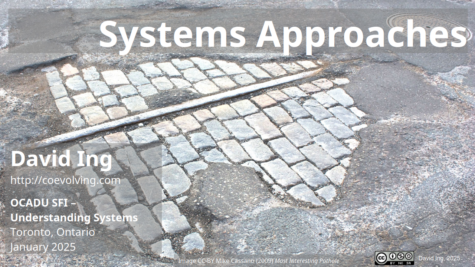The “Understanding Systems” SFIN-6011 course is a requirement in the master’s program in Strategic Foresight and Innovation at OCADU. For winter 2025, the class is now led by Stephen Davies, breaking the incremental evolving of content since 2008. While still on faculty at OCADU, the original course designer Peter H. Jones is now a Distinguished University Professor at Tecnologico de Monterrey, spending more time in Mexico City than Toronto. In the fall, Stephen and I discussed ways that the legacy course might be updated, since the field of systemic design has emerged and matured over 15+ years. I was one of the instructors with Peter of SFIN-6011 in winter 2020, and have prior experiences of writing systems thinking courses in 2018 for the UToronto iSchool, and at Aalto U. in 2016, in 2011, and in 2010.
From week 3 on, groups of students will lead short presentations on some systems approaches (e.g. system dynamics, soft systems methodology, viable system model). With short lead times to prepare literature reviews, the primary class activity for these master’s students is the facilitation of peer discussions that will surface key ideas. They aren’t expected to become experts on these topics at this point. They can get a sense of when and where a specific systems approach might be prioritized as useful, or deselected in favour of alternatives. After the presentation leaders have concluded with their slides, the instructors can fill in a few blanks.
The week 2 lecture described the linkages between pattern language, project language, and method architecture. To accelerate absorption in reading journal articles, Generative AI was reviewed as a helpful option. Three products (free to the world) are Microsoft Copilot, Perplexity.ai, and NotebookLM. With appropriate prompting, these tools can provide a variety of concise summaries on specific written works, and sometimes comparisons across researchers on topics.
The lecture slides outlining the content are posted on the Coevolving Commons. An appreciation of generative AI products in use can be better gained by watching the video recording of the lecture.
This recording of slides and browser prompts into Gen AI is available on Youtube, with an alternate retention on the Internet Archive .
| Video | H.264 MP4 |
| Jan. 20 (1h57m) |
[20250120_SFIN6011 Ing_SystemsApproaches_878kbps.m4v (HD 878kbps 506MB) [on the Internet Archive] |
The reading list for the class includes the Systems Thinkers (2020) book by Magnus Ramage and Karen Shipp. Those chapters of about 5 pages in length provide contexts and examples of systems approaches My usual lecture on systems approaches by Russell Ackoff were abbreviated, leaving interested students to try out Generative AI to explore his body of work. Students were also referred to the Systems Thinking Ontario sesson on “Generative AI and Inquiring Systems: Ways of Patterning and Ways of Knowing“, from early January.
For 2025, the Understanding Systems course provides learning for the instructors, as well as for the students. The earlier parts of the course emphasize methods that might be selected for project work. The focus then switches onto systemic design tools, and multimethodologies. The syllabus is being revised incrementally, and students have been alerted to not get too far ahead. With much of the turbulence in the world at the beginning of 2025, perhaps this course is mirroring the extent of changes we are currently experiencing.



